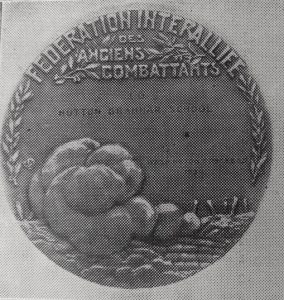
Hutton Grammar School’s FIDAC Peace Medal, 1930
The Huttonian, No 11, Christmas Term 1931
Courtesy of Lancashire Archives, Archive ref: DDX777/25
Hutton Grammar School’s magazine, ‘The Huttonian,’ does not record when the junior branch of the League of Nations Union (LNU) was founded or any details of their events over the academic year except for the LNU lectures. However, it must have been well supported and active, as in 1930 the school was awarded the FIDAC Peace Medal. According to the report in ‘The Huttonian,’ this was awarded every year by the British Legion to the three British schools ‘doing most to make known and support the ideals and activities of the League.’ (1)
The school had enrolled every school pupil in the junior branch of the LNU in the autumn term of 1930. Pupils performed a LNU play called ‘Bringing it home to Mr Chibley,’ described in the school magazine as an ‘excellent piece of propaganda.’ An Armistice Day recruiting campaign had resulted in nearly 100 adults enrolling in the LNU. At the end of the autumn term the school hired the Empire Theatre, Preston, to show the film ‘The World War and After’ to the school and 800 invited pupils from other Preston secondary schools. The film showed how the League of Nations had solved disputes without war. A League of Nations holiday essay competition for all the school had been well-supported with three prizes awarded per form. Annual lectures were given by experienced LNU speakers, such as Frederick Whelen, Alex Wilson and Mr Starkey. Fifth and Sixth formers debated Abyssinia and Saarland in 1935. The LNU is not mentioned in ‘The Huttonian’ after 1935 but that does not mean that it did not exist at the school.
References/Further Reading:
(1) The ‘Huttonian’ explains that the idea and the medals came from the Federation Interalliee des Anciens Combattants, a world alliance of 89 Associations of ex-servicemen, which at the time had 9 million members. Medals in 1930 also went to Mill Hill School and Barmouth Intermediate School. Honourable mentions went to Sedbergh, Poulton and Cheadle Hulme . Similar awards were made to schools in other League countries.
The Huttonian, Nos 4-18, 1924-38. Archive ref: DDX777/24, DDX777/25, DDX777/26, Lancashire Archives.

